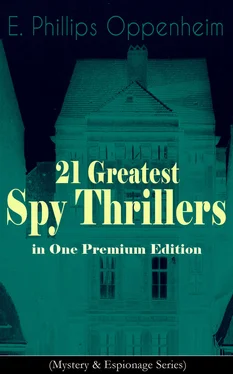Selingman glanced towards the closed door.
“Supposing,” he said, dropping his voice a little, “supposing I were to tell you, young man, that I entirely agreed with your friend? Supposing I were to tell you that, possibly by accident, he has stumbled upon the exact truth? What would you say then?”
Norgate shrugged his shoulders.
“Well,” he observed, “we’ve agreed, haven’t we, that a little lesson would be good for England? It might as well come now as at any other time.”
“It will not come yet,” Mr. Selingman went on, “but I will tell you what is going to happen.”
His voice had fallen almost to a whisper, his manner had become portentous.
“Within a week or two,” he said, “Germany and Austria will have declared war upon Russia and Servia and France. Italy will join the allies—that you yourself know. As for England, her time has not come yet. We shall keep her neutral. All the recent information which we have collected makes it clear that she is not in a position to fight, even if she wished to. Nevertheless, to make a certainty of it, we shall offer her great inducements. We shall be ready to deal with her when Calais, Ostend, Boulogne, and Havre are held by our armies. Now listen, do you flinch?”
The two men were still standing in the middle of the room. Selingman’s brows were lowered, his eyes were keen and hard-set. He had gripped Norgate by the left shoulder and held him with his face to the light.
“Speak up,” he insisted. “It is now or never, if you mean to go through with this. You’re not funking it, eh?”
“Not in the least,” Norgate declared.
For the space of almost thirty seconds Selingman did not remove his gaze. All the time his hand was like a vice upon Norgate’s shoulder.
“Very well,” he said at last, “you represent rather a gamble on my part, but I am not afraid of the throw. Come back to our bridge now. It was just a moment’s impulse—I saw something in your face. You realise, I suppose—but there, I won’t threaten you. Come back and we’ll drink a mixed vermouth together. The next few days are going to be rather a strain.”
Table of Contents
Norgate’s expression was almost one of stupefaction. He looked at the slim young man who had entered his sitting-room a little diffidently and for a moment he was speechless.
“Well, I’m hanged!” he murmured at last. “Hardy, you astonish me!”
“The clothes are a perfect fit, sir,” the man observed, “and I think that we are exactly the same height.”
Norgate took a cigarette from an open box, tapped it against the table and lit it. He was fascinated, however, by the appearance of the man who stood respectfully in the background.
“Talk about clothes making the man!” he exclaimed. “Why, Hardy, do you realise your possibilities? You could go into my club and dine, order jewels from my jeweller. I am not at all sure that you couldn’t take my place at a dinner-party.”
The man smiled deprecatingly.
“Not quite that, I am sure, sir. If I may be allowed to say so, though, when you were good enough to give me the blue serge suit a short time ago, and a few of your old straw hats, two or three gentlemen stopped me under the impression that I was you. I should not have mentioned it, sir, but for the present circumstances.”
“And no wonder!” Norgate declared. “If this weren’t really a serious affair, Hardy, I should be inclined to make a little humorous use of you. That isn’t what I want now, though. Listen. Put on one of my black overcoats and a silk hat, get the man to call you a taxi up to the door, and drive to Smith’s Hotel. You will enquire for the suite of the Baroness von Haase. The Baroness will allow you to remain in her rooms for half an hour. At the end of that time you will return here, change your clothes, and await any further orders.”
“Very good, sir,” the man replied.
“Help yourself to cigarettes,” Norgate invited, passing the box across. “Do the thing properly. Sit well back in the taxicab, although I’m hanged if I think that my friend Boko stands an earthly. Plenty of money in your pocket?”
“Plenty, thank you, sir.”
The man left the room, and Norgate, after a brief delay, followed his example. A glance up and down the courtyard convinced him that Boko had disappeared. He jumped into a taxi, gave an address in Belgrave Square, and within a quarter of an hour was ushered into the presence of Mr. Spencer Wyatt, who was seated at a writing-table covered with papers.
“Mr. Norgate, isn’t it?” the latter remarked briskly. “I had Mr. Hebblethwaite’s note, and I am very pleased to give you five minutes. Sit down, won’t you, and fire away.”
“Did Mr. Hebblethwaite give you any idea as to what I wanted?” Norgate asked.
“Better read his note,” the other replied, pushing it across the table with a little smile.
Norgate took it up and read:—
“My dear Spencer Wyatt,
“A young friend of mine, Francis Norgate, who has been in the Diplomatic Service for some years and is home just now from Berlin under circumstances which you may remember, has asked me to give him a line of introduction to you which will secure him an interview during to-day. Here is that line. Norgate is a young man for whom I have a great friendship. I consider him possessed of unusual intelligence and many delightful gifts, but, like many others of us, he is a crank. You can listen with interest to anything he may have to say to you, unless he speaks of Germany. That’s his weak point. On any other subject he is as sane as the best of us.
“Many thanks. Certainly I am coming to the Review. We are all looking forward to it immensely.
“Ever yours,
“JOHN W. HEBBLETHWAITE.”
Norgate set down the letter.
“There are two points of view, Mr. Spencer Wyatt,” he said, “as to Germany. Mr. Hebblethwaite believes that I am an alarmist. I know that I am not. This isn’t any ordinary visit of mine. I have come to see you on the most urgent matter which any one could possibly conceive. I have come to give you the chance to save our country from the worst disaster that has ever befallen her.”
Mr. Spencer Wyatt looked at his visitor steadily. His eyebrows had drawn a little closer together. He remained silent, however.
“I talk about the things I know of,” Norgate continued. “By chance I have been associated during the last few weeks with the head of the German spies who infest this country. I have joined his ranks; I have become a double traitor. I do his work, but every report I hand in is a false one.”
“Do you realise quite what you are saying, Mr. Norgate?”
“Realise it?” Norgate repeated. “My God! Do you think I come here to say these things to you for dramatic effect, or from a sense of humour, or as a lunatic? Every word I shall say to you is the truth. At the present moment there isn’t a soul who seriously believes that England is going to be drawn into what the papers describe as a little eastern trouble. I want to tell you that that little eastern trouble has been brought about simply with the idea of provoking a European war. Germany is ready to strike at last, and this is her moment. Not a fortnight ago I sat opposite the boy Henriote in a cafe in Soho. My German friend handed him the money to get back to his country and to buy bombs. It’s all part of the plot. Austria’s insane demands are part of the plot; they are meant to drag Russia in. Russia must protest; she must mobilise. Germany is secretly mobilising at this moment. She will declare war against Russia, strike at France through Belgium. She will appeal to us for our neutrality.”
“These are wonderful things you are saying, Mr. Norgate!”
Читать дальше












